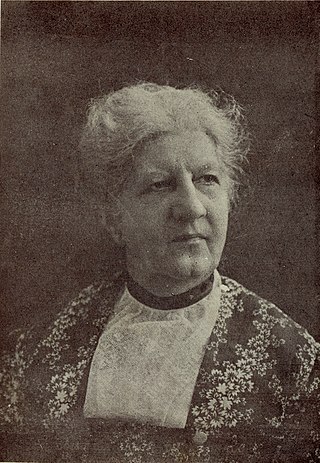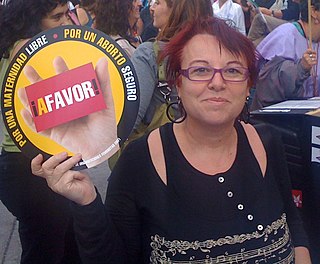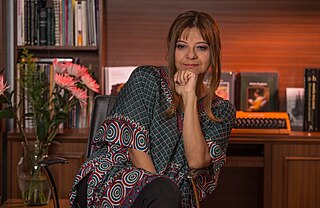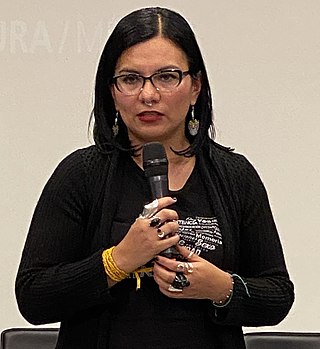Related Research Articles

María Elena Meneses Rocha was a Mexican journalist, professor of journalism and researcher into media, communications and the Internet with the Monterrey Institute of Technology and Higher Education, Mexico City. On the campus she taught and was the coordinator of the Cátedra Sociedad de la Información, which does research and consulting in mass media and information technology. She also worked with mass media, as a writer and as a commentator for print, broadcast and Internet media, mostly commenting on information technologies.

Sofía Montenegro Alarcón is a Nicaraguan journalist, social researcher, and feminist. Montenegro's family were militarily aligned with the Somoza forces, but her feminist and Marxist studies moved her to join with the opposition to the regime. She fought in the Sandinista Revolution and though initially supportive of the Sandinista Party, later became an outspoken critic, saying it had moved to the right. She served as an editor of various divisions of the official Sandinista newspaper, Barricada, until 1994, when she founded the Center for Communication Research (CINCO) as an independent research organization free of government influence. She has written broadly on power, gender, and social interaction.
Consuelo González Ramos was a Spanish journalist, nurse, and feminist.
Aída Peláez Martínez, also known by her pseudonym Eugenio, was a Cuban writer, journalist, suffragist, and feminist activist. She was one of the architects of Cuba's women's suffrage campaign of the 1910s, along with Digna Collazo and Amalia Mallén. To this end, she participated in various pro-feminist organizations.

María Collado Romero was a Cuban journalist, poet, and feminist. She was the first female news reporter and parliamentary reporter in Cuba. She was the creator and president of the Democratic Suffragist Party of Cuba.

Domitila García Doménico de Coronado was a Cuban writer, journalist, editor, and professor, considered to be the first women to practice journalism in her country.
Carmen Velacoracho de Lara (1880s–1960) was a Spanish-Cuban writer, journalist, feminist, monarchist, and women's rights activist. She was co-author of El libro amarillo, a pro-feminist manifesto published in Cuba in the early 20th century, which she drafted along with her husband, landowner Pío Fernández de Lara Zalda.

Margarita Rivière Martí was a Spanish journalist and writer, the author of thousands of newspaper articles and interviews and 30 books. She was noted for her progressive and feminist spirit in the years of the Transition. She was one of the first women to practice journalism in Spain, and she and Teresa Rubio were the first two female journalists for the Diario de Barcelona. In 1978 she was one of the founders of El Periódico de Catalunya.

Amparo Rubiales Torrejón is a Spanish politician who belongs to the political party PSOE and is ex-counsellor of the Junta de Andalucía. She holds a PhD in Laws, and is a lawyer and Senior Lecturer of Administrative Law at the University of Seville.

Cándida Martínez López is a Spanish historian, university professor, expert in women's history and studies, and politician. From 2000 to 2008 she was Councilor of Education of the Regional Government of Andalusia, and from 2008 to 2011 a deputy of the 9th Legislature of Spain. She is co-director of Arenal, Journal of Women's History.

Montserrat Boix Piqué is a Spanish journalist, considered among the most influential women in her country. In early 2000, she created and developed the concepts of social cyberfeminism, and a year later those of feminist hacktivism. Another of her main areas of work is gender violence and communication. She has also stood out as a defender of the right to communication and citizenship rights for women. Since 1986, she has been a journalist for the Information Services of Televisión Española (TVE), in the international section.

Isabel Agatón Santander is a Colombian poet, lawyer, writer and feminist. Promoter of the Rosa Elvira Cely Law which defines femicide as a crime in Colombia, she integrated the editorial commission of Law 1257 of 2008 about violence against women. She was a judge in the Tribunales de Conciencia de Justicia Para las Mujeres in Nicaragua (2015) and El Salvador in which they tried cases of sexual violence and femicide convened by the Red Feminista frente a la Violencia contra las Mujeres (REDFEM) and the Red contra Violencia of the respective countries.

María Isabel Díaz Lago is a Cuban actress. A graduate of the Instituto Superior de Arte, her first film role was in Una novia para David. She became the first Cuban "Almodóvar girl", appearing in the 2006 film Volver. On the small screen, she is best known for her role as Soledad "Sole" Núñez Hurtado on Locked Up. She has resided in Spain since 1996.

Mirta Rodríguez Calderón is Cuban journalist based in Santo Domingo, Dominican Republic. She is known for her advocacy of feminist journalism and gender equality in media. She co-founded the International Network of Journalists With a Gender Perspective in 2005, and is a promoter of alliances among journalists in Ecuador, the Dominican Republic, and Cuba, with the aim of including gender-based approaches in social communication.

Raquel Ramírez Salgado is a Mexican researcher, communicator, feminist and women's rights activist.
Alicia Gómez Montano was a Spanish radio and television journalist and a university professor. She began her journalistic career at Radio Madrid in 1978 and subsequently worked at Radio Nacional de España (RNE) between 1980 and 1988. Montanto was RNE's Head of National Information at Televisión Española (TVE) and then was made deputy director of the TVE current affairs television programme Informe Semanal in 1996. She was director of Informe Semanal between May 2004 and August 2012 and was elected vice-president of the Spanish section of Reporters Without Borders in late 2017. Montano was appointed RTVE's first Equality Director in October 2018 and served in the role until her death in January 2020. She won various awards for her journalistic work.

María Isabel Fernández Suárez is a Bolivian journalist and politician who served as minister of communication from January to June 2020. Fernández was the final official to serve in that post, with the Ministry of Communication being abolished during her term. She subsequently served as vice minister of communication from June 2020 until the conclusion of the transitional government of Jeanine Áñez in November 2020.

Florence Thomas is a French-Colombian social psychologist and feminist academic. She was a co-founder of the Programa de Estudios de Género, Mujer y Desarrollo at the National University of Colombia. She is also a journalist for the newspaper El Tiempo. Thomas was honored with the Premio Nacional de Periodismo Simón Bolívar in 2005. In 2017, Thomas was decorated as a Knight in France's Legion of Honour.

Alejandro Hernández Díaz is a Cuban screenwriter, novelist and lecturer based in Spain. He is a recurring co-scribe of the films directed Manuel Martín Cuenca and Mariano Barroso.
Stella Manuela Juliana Calloni Leguizamón is an Argentine journalist and writer specializing in international politics, whose investigative work focuses on Latin American military dictatorships and related political processes. Her books Los años del lobo: la Operación Cóndor (1999) and Operación Cóndor, pacto criminal (2006) gather parts of her research into the campaign known as Operation Condor.
References
- 1 2 3 4 de Paz, Flor (8 March 2018). "Isabel Moya: Challenges for women in Cuba? Let's not think everything has already been achieved". Cuba Debate. translated and edited by Walter Lippmann. Retrieved 24 July 2020.
- 1 2 3 4 "Heroes: Isabel Moya". Uterish. Retrieved 2020-07-24.
- 1 2 Más, Sara (2018-03-06). "Cuba: Isa, lecciones de una gran mujer". Ameco Press (in European Spanish). Retrieved 2020-07-24.
- 1 2 3 Gordillo Piña, Lirians (7 March 2018). "Isabel Moya Richard: Mi primera Maestra Feminista". Coordinadora Estatal de Solidaridad con Cuba (in Spanish). Retrieved 2020-07-24.
- 1 2 3 4 Mantilla, Diana María (2019). "'Fue su tiempo, el de las mariposas': Isabel Moya, una vida dedicada a la comunicación incluyente". Nómadas (in Spanish) (51): 225–231. doi: 10.30578/nomadas.n51a13 . ISSN 0121-7550.
- ↑ "Cuba Editor Denounces US Broadcasts" . The Associated Press. 15 April 1998. Retrieved 24 July 2020– via EBSCOhost.
- ↑ LaBash, Cheryl (14 August 2011). "How people with disabilities fare in Cuba". Workers World. Retrieved 2020-07-24.
- ↑ "Fallece Isabel Moya, destacada periodista e investigadora". La Demajagua (in European Spanish). 2018-03-05. Retrieved 2020-07-24.
- ↑ "Falleció Isabel Moya, periodista, investigadora y profesora cubana". Vangardia (in European Spanish). 4 March 2018. Retrieved 2020-07-24.